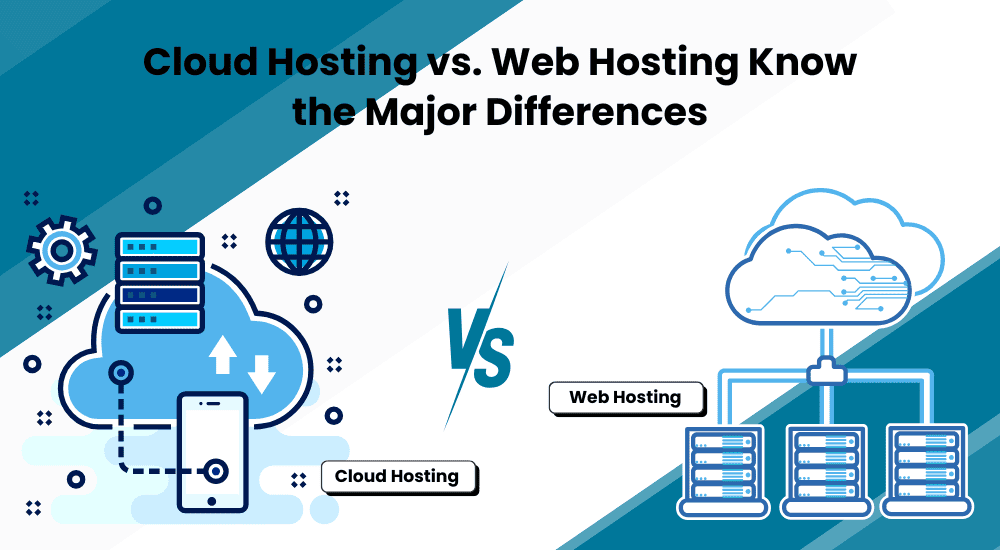
Cloud Hosting vs. Web Hosting: Know the Major Differences
Now, with the advent of the modern Internet, finding the most suitable hosting option for your website is next to impossible. Additionally, various options are now available, and it is important to know the differences between each hosting type. Two of the most popularly debated hosting are cloud hosting and web hosting.
This blog post will outline a comprehensive comparison of cloud versus web hosting, highlight the differences between cloud and web hosting, and study the advantages of cloud hosting over web hosting.
Table of Contents
ToggleUnderstanding Web Hosting
Web hosting is the service rendered to enable individuals and organizations to place their websites on the internet. Such a service provides a process whereby website files are held on the server and then downloaded by various users through the web. There are various types of web hosting, but these can be categorized into three general categories: shared hosting, VPS (Virtual Private Server) hosting, and dedicated hosting.
Key Features of Cloud Hosting
The functionality of your usage of the website is made to be very prone to choices when you are choosing a hosting service. Here are some of the important features that you seek in a hosting service:
- Storage Space: How much storage space you are provided with under your hosting plan determines how many data files you can store. Your website will thus require sufficient space for files, databases, and other media content depending on the nature of your website.
- Bandwidth: Bandwidth refers to the measurement of data transferred between your server and your visitors during a certain period. For high bandwidth, more traffic and fast speeds exist which is an important need for user experience.
- Server Type: Services of web hosting can be rendered using different servers, such as the ones that are categorized into shared, VPS (Virtual Private Server), or dedicated servers. It is very important to note that each type has its special level of performance, control, and resource allocation.
- Customer Support: Dependable customer support will ensure that all technical problems can be addressed promptly. Always look for a hosting company with 24/7 support through live chat, email, and phone.
- Control Panel: Security is also vital to protect your website and data. Thus, seek services featuring SSL certificates, firewalls, DDoS protection, and backups to secure against threats.
- Scalability: Over time, your website can become quite big and require an upgrade from a shared server. Be sure to select hosts with scalable packages so that you are allowed to expand the needed elements for increasing visitors without having severe downtime.
- Email Hosting: Offered services that are usually web hosting enable you to create professional email accounts, and these come associated with your domain. This allows your brand to appear much more credible.
Cloud Hosting vs. Web Hosting Comparison
Resource Allocation
Static web hosting is often characteristic in resource assignment to a particular server. This means that in case your site suddenly receives a tsunami of visitors, performance will be adversely affected. Instead, cloud hosting works over a large network of servers that allocate resources dynamically based on needs, so that resources are always utilized to their fullest capacity regardless of traffic spikes.
Reliability and Uptime
Web hosting, especially shared hosting, faces reliability problems at times. When a problem arises with one particular website on a shared server, it can drag down the entire server and thus all those websites hosted on it. Cloud hosting fares better in this regard, however. Being distributed, with so many servers, in case one goes down, the others can take its place to improve uptime.
Pricing Structure
Fixed Pricing is typical with web hosting. You pay a fixed amount for a specific amount of resources which might be cheap but very inflexible. Cloud hosting, on the other hand, normally uses the “pay-as-you-go” model. With this model, you pay only for what you consume; it’s highly suitable for business houses that experience traffic fluxes.
Security
The security features vary with hosting types, but most cloud hosting possesses superior security because of its architecture. While traditional web hosting services usually present basic security protocols only, there are usually layers of security offered by cloud service providers, such as firewalls, data encryption, and regular data backups-all which help protect your data accordingly.
Performance
One’s performance could be wide-ranging. Web hosting would generally suffer by whichever means it had at its disposal, such as lower load times, during peak times. With cloud hosting though, it can keep performance in good condition even with a serious amount of traffic coming to the website. For one, this is of utmost importance for user experience and can even improve search rankings.

Control and Customization
Web hosting options especially shared hosting involve minimal control and flexibility. You can’t access advanced features or software configurations. Cloud hosting gives you control over your server environment and flexible customization to fit your needs more precisely.
Management and Maintenance
Updates, security patches, and even periodic backups for the server running your website in web hosting can be very time-consuming and require technical expertise. Managed services from cloud hosting providers allow all these tasks to be handled so that you can focus on more important business activities.
Benefits of Cloud Hosting vs. Web Hosting
- Enhanced Scalability: One of the greatest advantages that cloud hosting comes with is scalability. Suppose your website has overnight gained such enormous attention or the number of visitors has increased very rapidly; then, with cloud hosting, it will be able to handle this with ease, without any clutter or traffic jam, while traditional web hosting may make you shift to a plan of greater scale, which would mean loss in terms of downtime.
- Better Performance: Cloud hosting usually provides better performance. Since it allows load distribution over a number of servers, this service ensures faster load times and a better experience for the users, which is very important for visitor retention and conversion improvement.
- Improved Reliability: This means that in cloud hosting, the probability of downtime is quite low since in case one server fails, then another can come in and take its place. This is a much better arrangement than traditional web hosting where one server failure can result in lost revenues through downtime and unhappiness from customers.
- Cost Efficiency: Even though pay-as-you-go models may seem to incur more costs upfront, such models can end up saving you money over time, especially for companies experiencing traffic ups and downs. Pay for only what you need organizations might be able to save compared with fixed web hosting plans.
- Enhanced Security Features: Generally, cloud hosting providers have established advanced protection mechanisms, as well as automatic backup schemes, advanced firewalls, and encryption of data.
Security is considered to be much better than in conventional web hosting and therefore must be regarded as highly secure for the storage of sensitive data. - Flexibility: More flexible in terms of technology and software. It will have new application deployment just like the configuration of environments. You may increase resources at times as needed. Such flexibility is one thing about cloud hosting, hence it can significantly benefit an innovative technology-based business.
Conclusion
It majorly depends on what you want to get out of the services when choosing between cloud hosting and traditional web hosting. For instance, if you have a website that is not too big and has minimal traffic, web hosting would do, but for big websites with really heavy traffic, cloud hosting is more recommended in terms of scalability, reliability, performance, and security.
In this comparison of cloud and web hosting, differences between cloud and web hosting were explored, and the advantages of cloud hosting over web hosting were highlighted. If you expect high growth, expect traffic peaks, or need tighter security and greater performance, cloud hosting should be a good fit for your online presence. Ultimately, knowing this will put you in a better position to make an informed decision that will align with your business objectives and ensure a seamless online experience for your users.
Frequently Asked Questions
Web hosting can be defined as the provision of virtual space by a hosting service provider to people and companies to publish their sites on the internet.
Some of the other common types of web hosting include shared hosting, VPS, dedicated hosting, and cloud hosting, all providing variations in resources and control.
Consider the size of your website, the amount of traffic you expect, and the technical requirements, budget, or other desired features such as storage, bandwidth, and support when you make a selection.
It should have reliable customer support because you definitely will need it to solve technical problems quickly. Seek a hosting provider that gives round-the-clock support through different media.
Most hosting providers will offer scalable options to ensure you can grow your website up to the plan and add more resources if they are required.